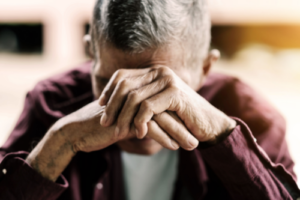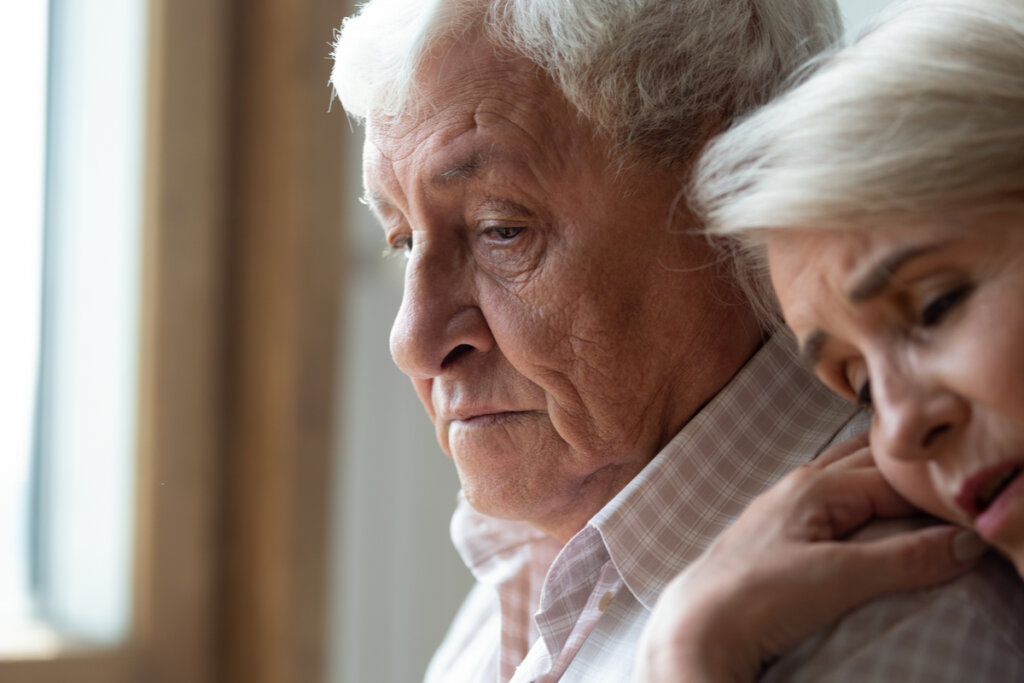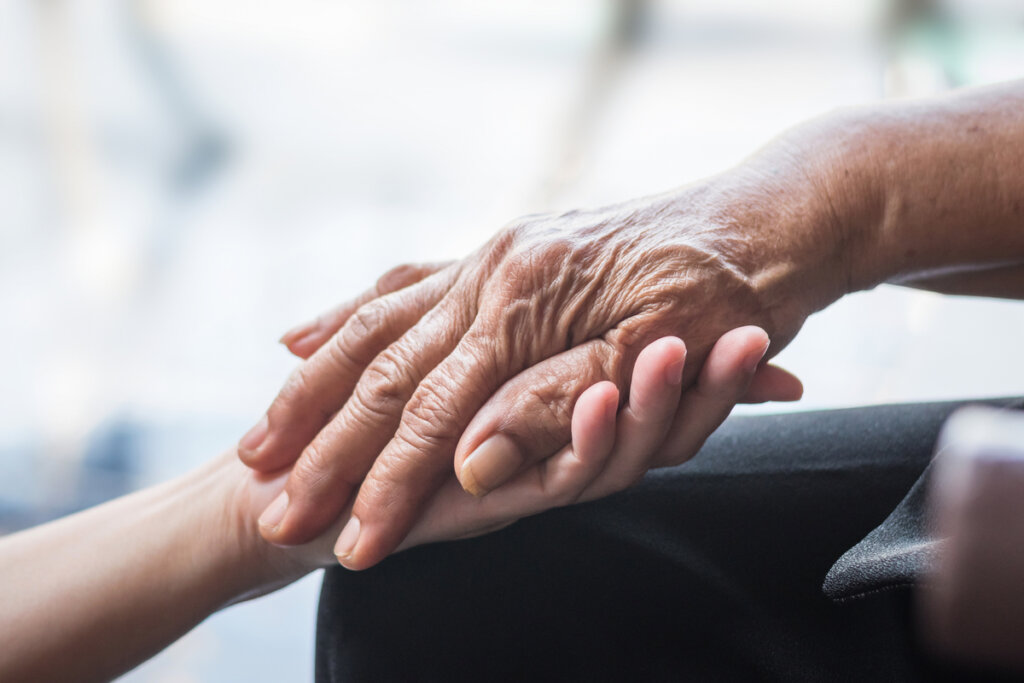Grief in the Elderly


Written and verified by the psychologist Gorka Jiménez Pajares
Grief in the elderly can be especially distressing for them. Indeed, the loss of close family members can be a tremendously painful experience. Unsurprisingly, it reaches the maximum level when an individual loses their partner. In fact, losing a lifetime companion who made them smile and shared their dreams can be heartbreaking.
In addition, the factors surrounding grief in the elderly are aggravated, since this stage of life is already characterized by the loss of social contacts.
“Mourning dares us to love once more.”
-Terry Tempest Williams-

Emotional luggage
In old age, people suffer many losses. They can be internal (changes in lifestyle) or external (loss of family, friends, or partner). When an elderly person loses their life partner, they find themselves in a situation where they must deal with both the pain of the loss and the need to have other support figures around them.
Some characteristics of grief in the elderly
All too often, grief in the elderly is accompanied by heartbreaking pain. This is due to the absence of the person who shared their life for so many years. Moreover, they might feel intense helplessness at finding themselves in a different and often cruel world.
Even if they want and try to start a new life, their physical health and external circumstances often constitute powerful barriers that make it impossible for them to do so. This is one of the reasons why we must pay special attention when it comes to providing love, affection, and support to older people who’ve lost their loved ones.
“The loss of relatives s the trigger for 20 percent of the cases of depression in the elderly.”
-Emilio Gamo Medina-
In old age, mourning for a friend, family member, or partner is different. These people are aware that their future is shorter than that of younger people. This can reduce the kind of faith and hope that’s intrinsic to grief at other stages of life.
Also, the culture, values, and society in which the elderly were raised are different from those of today. These changes can aggravate their feelings of disconnection from the world. Moreover, the anchors that kept them connected to the present are no longer there. This can trigger a real emotional avalanche that can be tremendously difficult to overcome.
Factors that aid recovery
Older people are often extraordinarily wise. Their experiences, the lessons they’ve learned, and the strategies they’ve developed throughout their lives can help them to face and resolve their difficulties and emerge into a new stage of life. Whether their pain is resolved or complicated will depend on how they deal with it.
Avoid overprotection
Overprotection is never good. In fact, too much attention can cause older people to lose certain skills much sooner.
An overprotected person is isolated from the processes that make us grow as people. Therefore, it’s important to be there for them, but not to do everything for them. They must face the situation themselves. You can help them by letting them know that you’re there for them but you mustn’t restrict them in any way.
“Tearless grief bleeds inwardly.”
-Christian Nevell-
Listen
If the older person talks about their loved one, listen to them. They’re building a narrative of the memories they shared with the deceased. It’s important for them. It means they can integrate the loss into their lives.
One way you can help is by paying attention to what they tell you. Even if they repeat themselves. Indeed, listening is part of the grieving process. Two-way listening is important. Try and paraphrase what they’re telling you or stop them to ask about a specific memory. For example, “Grandpa, tell me about that time Grandma did such and such…” can be a tremendously anxiolytic act.
“Honest listening is one of the best medicines we can offer the dying and the bereaved.”
-Jean Cameron-

Be with them
Until they reconnect with society and the environment, it’s important to invest your time with them. By this, we mean calling them, inviting them to do activities with you, or simply going to their house and sitting with them.
You may not even have to say anything. The mere act of connecting with them and letting them see that you’re there can be tremendously intimate. In fact, the intimacy that emanates from accompaniment is a powerful tool that reduces the loneliness of loss.
“The only cure for grief is to grieve.”
-Earl Grollman-
When we’re older we become more vulnerable. Losses begin to occur. These are completely natural because they’re produced by the effect of aging or illness. In the face of the death of children, younger siblings, or a spouse, more intense emotions are produced than in other cases, increasing the emotional discomfort they feel.
It’s for this reason that we must provide older people with support in a kinder, more intimate, and closer way. The elderly today built the world in which we now live. We should, therefore, be able to provide them with the necessary support so they can continue to live their lives healthily and with dignity, whenever they have to face a painful loss.
“It is old age, rather than death, that is to be contrasted with life.
-Simone de Beauvoir-
Grief in the elderly can be especially distressing for them. Indeed, the loss of close family members can be a tremendously painful experience. Unsurprisingly, it reaches the maximum level when an individual loses their partner. In fact, losing a lifetime companion who made them smile and shared their dreams can be heartbreaking.
In addition, the factors surrounding grief in the elderly are aggravated, since this stage of life is already characterized by the loss of social contacts.
“Mourning dares us to love once more.”
-Terry Tempest Williams-

Emotional luggage
In old age, people suffer many losses. They can be internal (changes in lifestyle) or external (loss of family, friends, or partner). When an elderly person loses their life partner, they find themselves in a situation where they must deal with both the pain of the loss and the need to have other support figures around them.
Some characteristics of grief in the elderly
All too often, grief in the elderly is accompanied by heartbreaking pain. This is due to the absence of the person who shared their life for so many years. Moreover, they might feel intense helplessness at finding themselves in a different and often cruel world.
Even if they want and try to start a new life, their physical health and external circumstances often constitute powerful barriers that make it impossible for them to do so. This is one of the reasons why we must pay special attention when it comes to providing love, affection, and support to older people who’ve lost their loved ones.
“The loss of relatives s the trigger for 20 percent of the cases of depression in the elderly.”
-Emilio Gamo Medina-
In old age, mourning for a friend, family member, or partner is different. These people are aware that their future is shorter than that of younger people. This can reduce the kind of faith and hope that’s intrinsic to grief at other stages of life.
Also, the culture, values, and society in which the elderly were raised are different from those of today. These changes can aggravate their feelings of disconnection from the world. Moreover, the anchors that kept them connected to the present are no longer there. This can trigger a real emotional avalanche that can be tremendously difficult to overcome.
Factors that aid recovery
Older people are often extraordinarily wise. Their experiences, the lessons they’ve learned, and the strategies they’ve developed throughout their lives can help them to face and resolve their difficulties and emerge into a new stage of life. Whether their pain is resolved or complicated will depend on how they deal with it.
Avoid overprotection
Overprotection is never good. In fact, too much attention can cause older people to lose certain skills much sooner.
An overprotected person is isolated from the processes that make us grow as people. Therefore, it’s important to be there for them, but not to do everything for them. They must face the situation themselves. You can help them by letting them know that you’re there for them but you mustn’t restrict them in any way.
“Tearless grief bleeds inwardly.”
-Christian Nevell-
Listen
If the older person talks about their loved one, listen to them. They’re building a narrative of the memories they shared with the deceased. It’s important for them. It means they can integrate the loss into their lives.
One way you can help is by paying attention to what they tell you. Even if they repeat themselves. Indeed, listening is part of the grieving process. Two-way listening is important. Try and paraphrase what they’re telling you or stop them to ask about a specific memory. For example, “Grandpa, tell me about that time Grandma did such and such…” can be a tremendously anxiolytic act.
“Honest listening is one of the best medicines we can offer the dying and the bereaved.”
-Jean Cameron-

Be with them
Until they reconnect with society and the environment, it’s important to invest your time with them. By this, we mean calling them, inviting them to do activities with you, or simply going to their house and sitting with them.
You may not even have to say anything. The mere act of connecting with them and letting them see that you’re there can be tremendously intimate. In fact, the intimacy that emanates from accompaniment is a powerful tool that reduces the loneliness of loss.
“The only cure for grief is to grieve.”
-Earl Grollman-
When we’re older we become more vulnerable. Losses begin to occur. These are completely natural because they’re produced by the effect of aging or illness. In the face of the death of children, younger siblings, or a spouse, more intense emotions are produced than in other cases, increasing the emotional discomfort they feel.
It’s for this reason that we must provide older people with support in a kinder, more intimate, and closer way. The elderly today built the world in which we now live. We should, therefore, be able to provide them with the necessary support so they can continue to live their lives healthily and with dignity, whenever they have to face a painful loss.
“It is old age, rather than death, that is to be contrasted with life.
-Simone de Beauvoir-
All cited sources were thoroughly reviewed by our team to ensure their quality, reliability, currency, and validity. The bibliography of this article was considered reliable and of academic or scientific accuracy.
-
Higuera, J. C. B. (2020). Acompañamiento en el duelo. In La humanidad puesta a prueba: bioética y COVID-19 (pp. 347-360). Universidad Pontificia Comillas.
-
Durbán, M. V., Loarte, M. M., Higuera, J. C. B., Maza, R. C., & Fernández, I. S. (2014). Estudio del perfil de una población de personas en duelo complicado que acuden a un centro de escucha de duelo. Medicina paliativa, 21(3), 91-97.
-
Díaz, M. J. M., & Roldán, R. L. (1999). Estructura constructiva y duelo patológico en la vejez. Psiquis: Revista de psiquiatría, psicología médica y psicosomática, 20(6), 43-49.
-
LASECA, L. A., SANZ, V. B., & JIMÉNEZ, P. F. EL DUELO EN LA TERCERA EDAD. XXI Congreso Virtual Internacional de Psiquiatria, Psicología y Enfermería en salud mental. https://psiquiatria.com/congresos/pdf/1-7-2020-2-COMU5.pdf
-
Medina, E. G., & Pezzi, P. P. (2009). El duelo y las etapas de la vida. Revista de la asociacion española de Neuropsiquiatria, 29(104), 455-469.
This text is provided for informational purposes only and does not replace consultation with a professional. If in doubt, consult your specialist.







